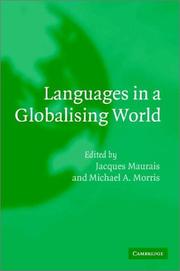| Listing 1 - 2 of 2 |
Sort by
|
Book
ISBN: 1443899135 9781443899130 1443895393 9781443895392 Year: 2016 Publisher: Newcastle-upon-Tyne Cambridge Scholars Publishing
Abstract | Keywords | Export | Availability | Bookmark
 Loading...
Loading...Choose an application
- Reference Manager
- EndNote
- RefWorks (Direct export to RefWorks)
This anthology of papers, written by Christina Schäffner, brings together a selection of articles on the theme of translation and politics. Written from the perspective of translation studies and critical discourse analysis, it provides an overview of the textual and ideological factors that determine processes of translation within the arena of international politics. The selected articles afford a fascinating insight into the dynamics of intercultural exchange against the backdrop of European politics from the fall of the Berlin Wall to debates on EU enlargement. By taking a context-sensitive approach to linguistic description, this book will be of interest to scholars in various adjacent fields of research, such as (applied) linguistics, (intercultural) communication studies, media studies, political science and the sociology of globalisation, as well as to relevant higher education programmes around the world. The discipline of translation studies has made its mark by conceptualising translation as a form of cross-cultural communication that transcends asymmetrical relations of power, foregrounding issues such as (colonial) domination, (cultural) hegemony, and ideology. To date, however, there has been no compelling evidence of the linguistic implications of transnational political communication, and little research has been done to help us to understand how political discourse at the international level presupposes translation. Featuring a wealth of examples from political text and talk, each article here links contextual features to the linguistic choices of political actors. By moving beyond national and cultural boundaries, these analyses help the reader to get to grips with the discursive implications of power politics, and to open up a new debate for a novel area of studies that might be termed cross-cultural political discourse analysis.
Politiek --- Politieke teksten --- Taal en politiek. --- Translating and interpreting --- Vertalen --- Taalgebruik --- Vertalen. --- Political aspects --- Politieke aspecten. --- Interpretation and translation --- Interpreting and translating --- Language and languages --- Literature --- Translation and interpretation --- Translators --- Translating --- #KVHA:Vertaalwetenschap --- #KVHA:Politiek

ISBN: 0521821738 0521533546 1107126150 0511177461 0511042876 0511147813 0511325703 0511613733 1280434716 0511054653 9780511042874 9780521821735 9780511613739 9780511054655 9780511147814 9780521533546 9781107126152 9781280434716 9780511177460 9780511325700 Year: 2003 Publisher: Cambridge: Cambridge university press,
Abstract | Keywords | Export | Availability | Bookmark
 Loading...
Loading...Choose an application
- Reference Manager
- EndNote
- RefWorks (Direct export to RefWorks)
Throughout human history, the fate of languages has been closely linked to political power relationships. Political shifts in the international system continue to affect linguistic patterns, which today are still in a state of flux following the end of the Cold War. This book considers the effects of present-day trends in global politics on the relative status of languages, and the directions in which the linguistic hierarchy might develop in the future. What are the prospects for the continuing spread of English? Will other traditionally prominent languages such as French and German gain or lose influence? Will languages such as Arabic and Japanese increase in international status? Will minority languages continue to lose ground and disappear? The book assesses these prospects, looking at the major world regions, and with its interdisciplinary approach it will appeal to researchers and students of sociolinguistics and language planning as well as of international relations.
Langage -- Aspects sociaux --- Langage -- Sociologie --- Langage et société --- Language and languages -- Social aspects --- Language and languages -- Sociological aspects --- Language and society --- Langues -- Aspects sociaux --- Langues -- Sociologie --- Society and language --- Sociolinguistics --- Sociolinguistique --- Sociolinguïstiek --- Sociologie des langues --- Sociologie du langage --- Sociology of language --- Société et langage --- 800:316 --- 800:32 --- 800:32 Taal en politiek --- Taal en politiek --- 800:316 Sociolinguistiek --- Sociolinguistiek --- Language and languages --- Language and culture --- Linguistics --- Sociology --- Integrational linguistics (Oxford school) --- Political aspects --- Social aspects --- Sociological aspects --- Sociolinguistics. --- Political aspects. --- Langage et langues --- Aspect politique --- Arts and Humanities --- Language & Linguistics --- Language and languages Political aspects --- Language and languages - Political aspects.
| Listing 1 - 2 of 2 |
Sort by
|

 Search
Search Feedback
Feedback About UniCat
About UniCat  Help
Help News
News